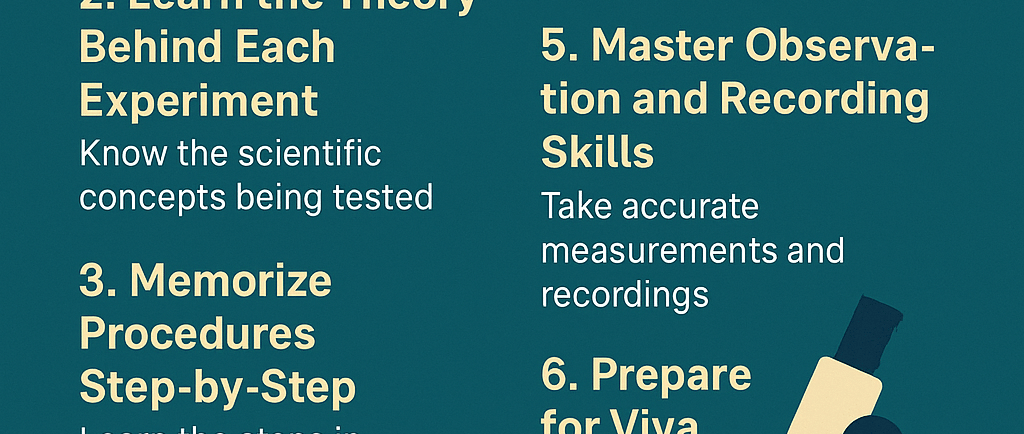How to Prepare for Science Practicals


Science practicals are an essential part of the learning process in subjects like Physics, Chemistry, and Biology. They bridge the gap between theoretical knowledge and real-world application, helping students understand concepts more deeply. Whether you are preparing for school-level practical exams or competitive assessments, a clear strategy can make a big difference in your performance.
1. Understand the Practical Syllabus
Before starting your preparation, go through the practical syllabus prescribed by your board or institution. Identify the list of experiments you need to perform in each subject. This ensures you don’t waste time on irrelevant activities and allows you to allocate time effectively to all experiments.
2. Learn the Theory Behind Each Experiment
A common mistake students make is focusing only on the procedure without understanding the scientific concept behind it. Every practical is designed to test your understanding of a theory you have learned in class. For example, in Physics, a pendulum experiment tests your grasp of periodic motion; in Chemistry, titration involves concepts like molarity and neutralisation. Understanding the “why” helps you perform better and answer viva questions confidently.
3. Memorise Procedures Step-by-Step
Each experiment follows a specific sequence of steps. Learn these steps in the correct order and practise them in your own words so that you can recall them easily. Writing the procedure in a neat, concise way in your practical record book also helps reinforce memory.
4. Practise Hands-On Work Regularly
Science practicals require skill, not just memory. Schedule regular lab practice sessions, even outside your normal timetable if possible. Handling apparatus, measuring accurately, and recording observations are skills that improve with repetition. The more you practise, the smoother your execution will be on exam day.
5. Master Observation and Recording Skills
Accurate observations are key to a good practical score. Always double-check measurements, note readings carefully, and maintain a clean, organised table of results. Use proper units and significant figures as per scientific conventions.
6. Prepare for Viva Questions
The viva voce is an integral part of practical exams, where examiners test your understanding. Prepare for common questions related to each experiment—such as definitions, principles, uses, sources of error, and safety precautions. Practising with classmates or teachers can boost your confidence.
7. Focus on Safety Precautions
Lab safety is not only essential for avoiding accidents but is also often part of the marking scheme. Learn and follow safety rules, such as wearing lab coats and goggles, handling acids with care, and not tasting chemicals. Being safety-conscious shows examiners you are a responsible student.
8. Revise from Past Practical Papers
If possible, look at previous years’ practical exam questions and viva topics. This will help you understand the pattern and focus areas, making your preparation more targeted.
Conclusion
Science practicals are an opportunity to bring textbook concepts to life. With a structured approach—understanding the theory, memorising the procedures, practising regularly, keeping accurate records, and preparing for viva—you can perform confidently and score well. Consistent effort in the lab not only ensures exam success but also builds skills that are valuable in higher studies and real-life scientific work.
